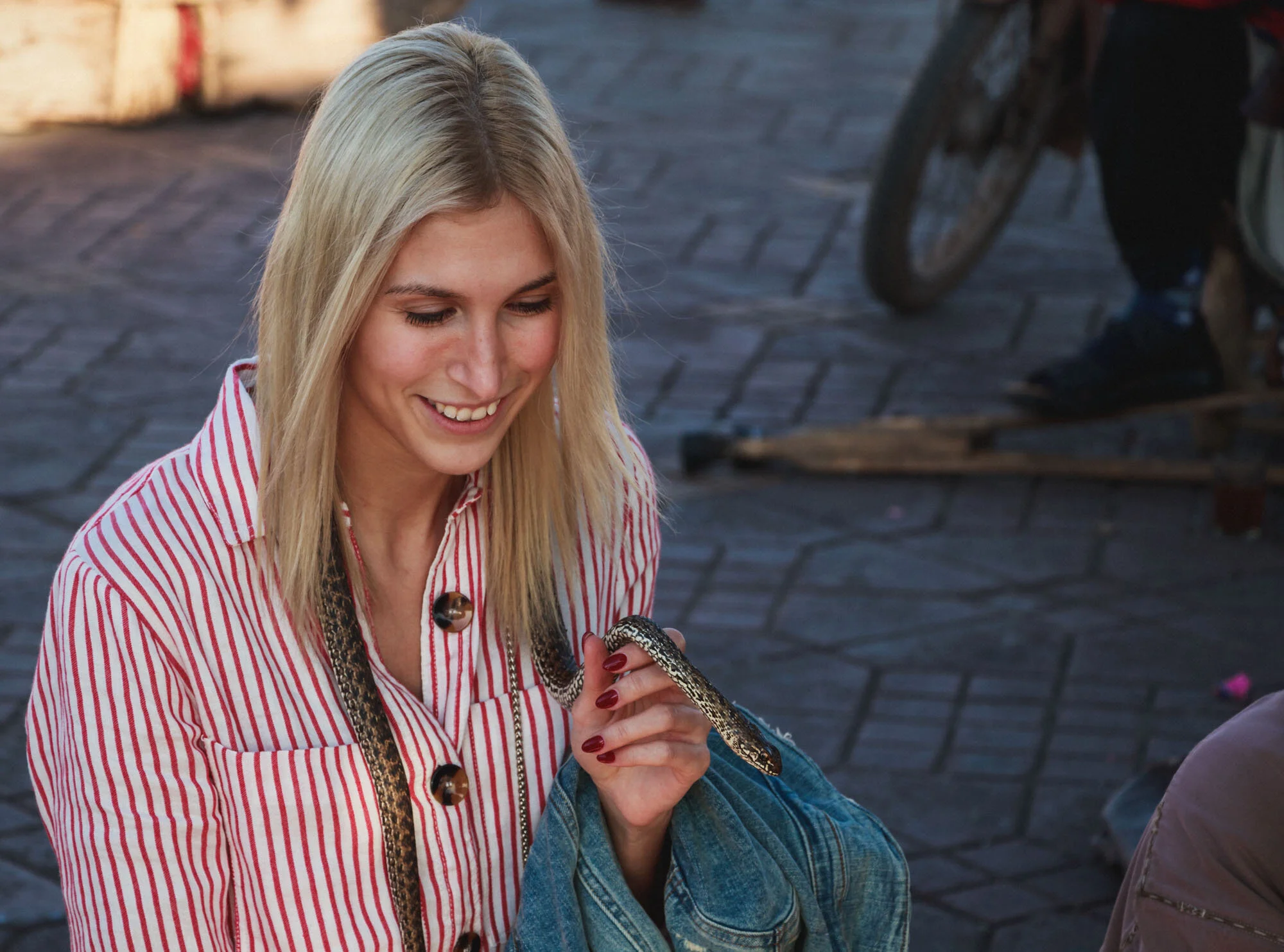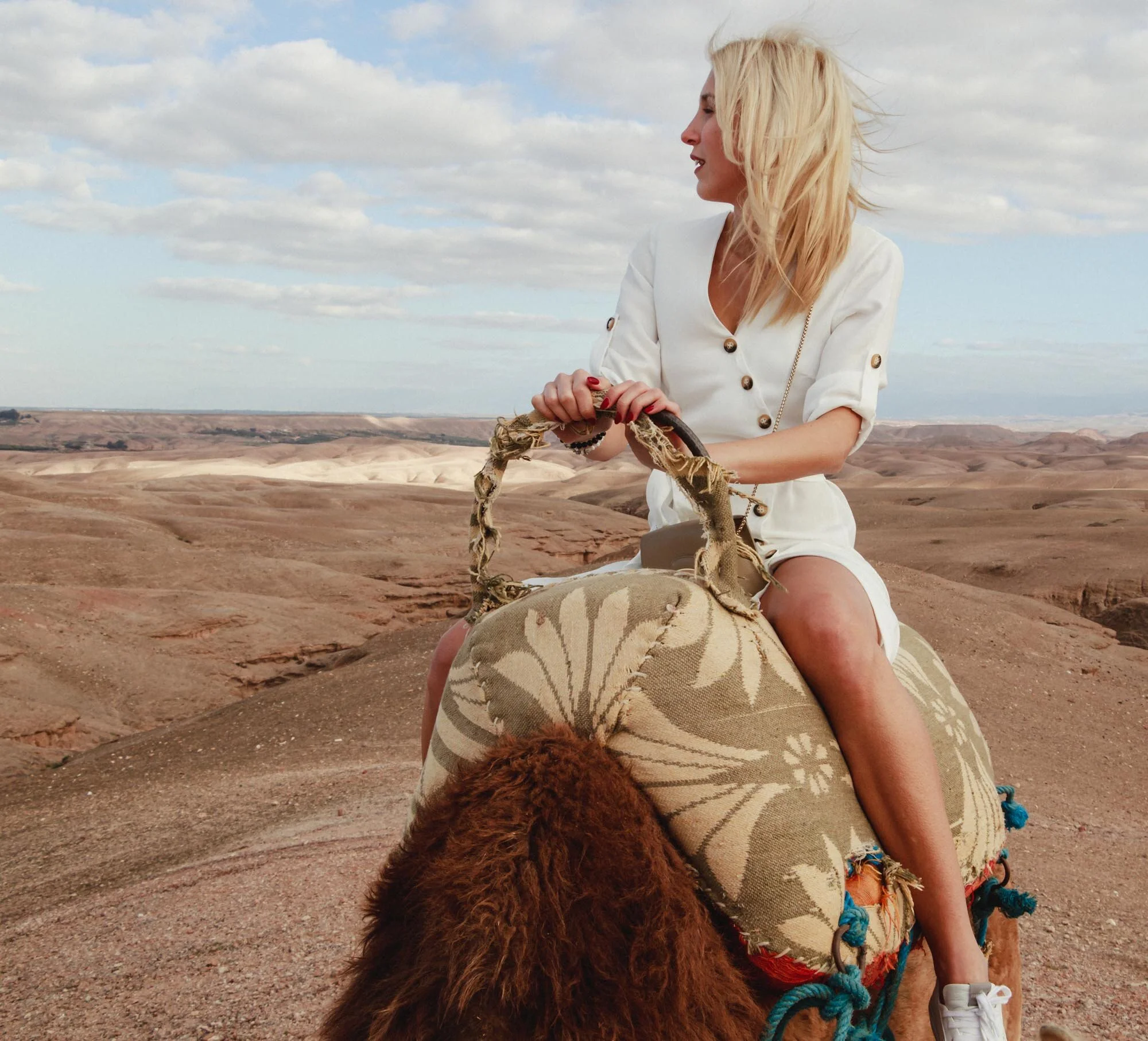How to avoid scams in Marrakech?
We found Marrakech to be very safe. However, we experienced some scam attempts or were made aware of. Jemaa el-Fnaa is a favourite hot spot for scams and pickpockets so be more aware there and don't linger too long. We recommend keeping a safe distance and firmly reject offers. If you want to accept offers, then it’s best to negotiate the price before as you will have no bargaining power after the fact.
Exotic Animals
When we first walked into Jemaa el-Fnaa and we spotted some snakes. As we were taking photos, snakes were wrapped around our neck and we got them to take photos of us behind a dancing cobra. Once we wanted to leave, they wanted €20 euro each. However, we negotiated after the fact and only paid €5 euro each. Once we quickly walked away we were bombarded with henna women and restaurant owners. Photos with monkeys on chains and people in costumes are other common scams.
Later, the riad staff explained the snake charming business. The small snakes around our necks weren’t poisonous but the Cobras are the second most poisonous snakes in Africa. When the cobras are dancing they are unable to attack. The music hurts their ears and they dance to minimise the pain. We were shocked to find out that they only live for about 15 days once taken from the wild.
Fake Nice Guy and Tour Guide
There are many people that may seem genuinely nice but they want money. I felt bad for being so cautious because there were a few times where someone was genuinely nice and wanted to help us.
Getting lost in the Medina is part of the fun. There were a few times when we asked shop owners for directions and they were willing to point us in the right direction. However, sometimes when we looked lost a local would offer unsolicited help to walk us where we wanted to go and we would feel obliged to give a tip.
From our experience, the iPhone maps application doesn’t have a correct map of the medina. Therefore it’s best to use a hard copy city map. Checking our current location and orientation helped us check we were walking in the correct direction.
Shop owners would sometimes offer to show us where the products are made which we rejected as they will most likely lead you through a maze and it is difficult to get out unless you buy something.
Several times when we were walking to tourist sights, locals would tell us that the place was closed to get our attention and attempt to take us to another place like tannery (leather making).
A scammer may pose as an official tour guide and not demand any money but at the end of the tour they will demand a tip or take you to a shop to pressure you to buy something.
Markets & Haggling
Don’t ask for the price unless you have the intention of buying something. When haggling, be patient, generally half the price of what they're asking and negotiate from there. To get an idea of how much an item should cost, ask the hotel staff. Items popular with tourists such as carpets and ceramics can occasionally be fake. For example, argan oil should be 100% pure however some souk/street vendors sell vegetable oil for an inflated price. Also once you have agreed to purchase a product, be aware that you may be distracted by an accomplice and the shop owner may swap the product.
Tours
We booked the camel ride through the Riad and arranged to pay on our last night. The guy who walked us from the Riad to the car to start the tour demanded that we had to pay cash and were pointed in the direction of an ATM. We were firm and told them we would only pay at the Riad. After 10 minutes of disagreement, they agreed to take us and we could pay later that night at the Riad. Apart from that hiccup, the tour was great. Avoid paying for tours upfront unless they are reputable companies or online.
Taxis
One way that taxi drivers can overcharge is by not turning on the meter. The best ways to avoid this is to organise a fixed fee taxi through your hotel or only take taxis that have working meters. Also never follow their recommendations as they could bring you to shops where they get a commission.
Wifi
One important tip that our Riad host gave us was to be careful of using wifi especially if it doesn’t have a password as your phone could get hacked.
Ready to use SIM cards can be purchased at shops if you need to use data. iPhone maps application doesn’t have a correct map of the labyrinth Medina. We only used wifi at the Riad or Restaurants. Your current location on maps still works on flight mode and this helped us to make sure we were walking in the correct direction.
ATMs
Be careful of ATMs and using your credit card in the markets. Some ATMs have card skimmers and pinhole cameras. You can avoid this by using ATMs at banks during the day, scan the area for suspicious characters and cover your pin.
Travel Insurance
You should always purchase travel insurance to cover yourself if something does go wrong.

